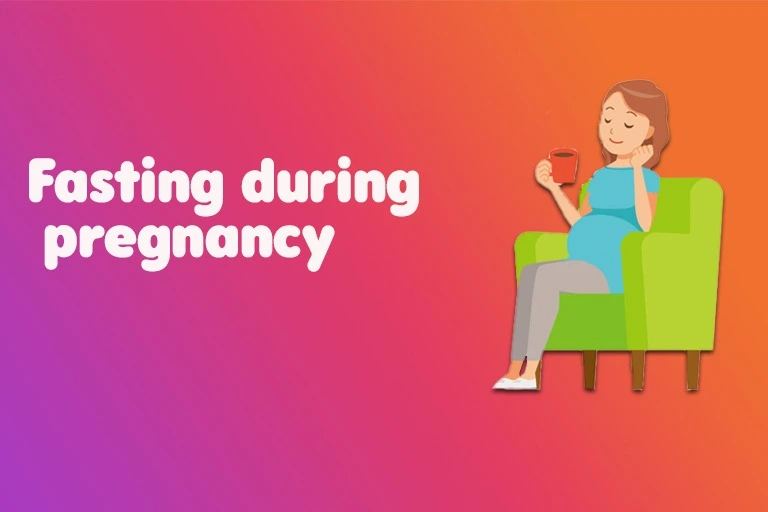12 compelling reasons to avoid Fasting during Pregnancy
The effects of fasting during Pregnancy on the health of mothers and the development of fetuses are a topic of discussion and worry.
Pregnancy is a time of joy and anticipation, where women revel in the freedom to indulge their cravings and listen to their instincts when it comes to food. It’s a time when dieting takes a backseat, allowing expectant mothers to enjoy their favorite treats without guilt.
While there are no broad medical assertions to suggest that fasting during Pregnancy is inherently unhealthy, the potential negative consequences tend to outweigh the positive aspects.
How may fasting during Pregnancy affect you and your unborn child?
Fasting during Pregnancy and the first trimester can have significant effects on both the mother and unborn child. It is essential to monitor blood sugar levels and consider breaking fasts if feeling weak or unwell. The effects of fasting can have long-term consequences on fetal and neonatal development, making it crucial to be cautious and find ways to cope with fasting during this challenging time.
Causes for not fasting while pregnant
Pregnant women may experience potential pressure from fasting during their Pregnancy, potentially leading to high blood pressure and other complications, requiring informed consultation with healthcare providers.
Constant nausea
Morning sickness, or persistent nausea during Pregnancy, is a typical ailment that many expecting women deal with. Symptoms such as nausea, vomiting, and general stomach discomfort are frequently seen. Although it usually happens in the first trimester, some pregnant women may continue to have it.
Pregnancy-related nausea can be difficult to control, but it can be lessened by eating small, frequent meals, drinking enough water, and avoiding triggers like harsh scents or particular foods. Pregnant women who have persistent nausea should speak with a healthcare provider for tailored advice and treatment options.
Risk of Nutritional Lack
More nutrients are needed during Pregnancy for the health of both the mother and the unborn child. A vitamin and mineral deficit brought on by fasting increases the likelihood of problems. Poor nutrition during Pregnancy might have adverse effects, including low birth weight and delayed development.
Therefore, a well-balanced diet is essential for pregnant mothers to prioritize to guarantee appropriate nutrition for both the mother and the fetus and reduce the risk of problems.
Effect on fetal growth.
Fetal growth is an essential factor to consider during Pregnancy. It is necessary to be cautious when fasting while pregnant or breastfeeding, as it can potentially harm the fetus. Studies have shown that trimester fasting can lead to adverse outcomes for maternal and fetal health. It is crucial to weigh the risks and benefits of maternal fasting during Pregnancy and consider alternative ways to cope with it.
Risk of Pregnancy Diabetes:
Blood sugar changes brought on by fasting can raise the risk of gestational diabetes in pregnant women. High birth weight and difficult deliveries are only two of the issues that gestational diabetes can cause for both the mother and the unborn child.
For the woman and the unborn child to have a healthy pregnancy and reduce the risk of gestational diabetes, stable blood sugar levels must be maintained through regular meals and snacks.
Issues with Dehydration
There are serious risks associated with dehydration when pregnant. It can cause health issues for the mother, such as headaches, exhaustion, and dizziness, which makes it challenging to handle the physical demands of Pregnancy. Inadequate fluid consumption can also have an impact on the health of the fetus, possibly leading to development limitations and premature labor because of decreased oxygen and blood supply to the placenta.
Urinary tract infections, abnormalities during labor and delivery, and electrolyte imbalances emphasize the significance of maintaining adequate hydration. Pregnant women should prioritize regular fluid intake to reduce these risks and maintain the health of both mother and fetus, particularly during fasting or hot weather.
Hypertension
Low blood pressure, or hypotension, can be dangerous during Pregnancy, especially if you are fast. Reduced blood flow to essential organs, such as the brain, can cause dizziness, light-headedness, and fainting spells in expectant moms. Fasting can make this problem worse by lowering blood pressure even further.
Low blood pressure during Pregnancy can be dangerous for the health of the mother and the fetus, and it can cause problems like the baby receiving less oxygen. To prevent and treat low blood pressure during Pregnancy, it is crucial to maintain appropriate diet and hydration, especially when fasting is taken into account.
Impact on Breastfeeding
Breastfeeding can be significantly impacted by fasting during Pregnancy. The supply and quality of milk are greatly influenced by maternal nutrition, and fasting may upset this delicate balance. The body may find it challenging to generate enough breast milk when it is malnourished, which could make nursing more difficult.
Furthermore, fasting might change breast milk’s nutritional makeup, which could harm the infant’s health. Pregnant women who intend to breastfeed their child should, therefore, emphasize getting enough nourishment to assist nursing success and think about how fasting may affect their capacity to nourish their unborn child.
Possible Issues during Childbirth
Despite being a normal process, giving birth can cause several problems, particularly for women who fast during their pregnancies. Complications during labor and delivery may arise from dehydration and nutrient shortages brought on by fasting.
Reduced uterine contractions, an extended labor period, and a higher chance of needing medical interventions like assisted birth or cesarean surgery are some of these consequences. Furthermore, fasting may exacerbate maternal weakness and exhaustion, making it harder for women to withstand the rigors of childbirth.
To lower the risk of difficulties associated with childbirth, pregnant moms must prioritize getting enough nourishment and hydration during their Pregnancy.
Effect on the Health of Mothers
Fasting during Pregnancy affects both the mother’s general health and the development of the fetus. Research has indicated that a higher risk of difficulties and health issues for the neonate can result from fasting during Pregnancy. Compared to moms who do not fast or who fast, groups of mothers who fast during Pregnancy may face additional health issues. The hazards and implications of fasting can differ based on the mother’s overall pregnancy status and her specific medical problems.
Destruction of the Mother-Fetal Bond
The significant effect of fasting during Pregnancy on fetal development has raised concerns about the health of Pregnancy. Fasting during Pregnancy can hurt the neonatal outcomes, leading to potential risks for both the mother and baby. Fasting for long hours on fasting days can disrupt the mother-fetal bond and affect the overall wellbeing of the unborn child.
Fasting groups have recommended that pregnant women refrain from fasting during Pregnancy to ensure the proper growth and development of the fetus. The mother-fetal bond is crucial for the emotional and physical health of both the mother and baby, and any disruption caused by fasting can have long-lasting effects.
Dangerous Long-Term Effects
There is a chance that fasting during Pregnancy will have harmful long-term impacts on the mother and the unborn child. Although problems during childbirth and nutritional deficits may be among the immediate effects, the effects may not stop with delivery. Long-term fasting may raise the mother’s chance of getting chronic illnesses like diabetes, osteoporosis, and cardiovascular disease in the future.
In a similar vein, the offspring of pregnant women who fasted might have an increased chance of developing chronic illnesses, metabolic problems, and delayed cognitive development as adults. For the best possible outcomes for the health of the mother and the unborn child, it is imperative to understand the potential long-term effects of fasting during Pregnancy and to give proper nourishment priority.
Organ infection in the urine
During Pregnancy, urinary tract infections are a significant risk, particularly during fasting. Urinary tract infections are caused by bacteria that enter the urinary tract and cause symptoms, including burning or pain when urinating frequent urination, and discomfort in the lower back. Due to dehydration, which lowers urine production and raises the concentration of germs in the urinary system, fasting may increase the risk of UTIs.
Pregnancy-related hormonal changes and increased bladder pressure make pregnant women more vulnerable to urinary tract infections. To avoid UTIs and protect the health of both the mother and the fetus, it is crucial for expecting moms to drink plenty of water and practice proper cleanliness.
Premature births during Pregnancy
Premature births, sometimes referred to as preterm births, happen when a baby is delivered before the full 37 weeks of Pregnancy. Fasting during Pregnancy raises the possibility of an early delivery, which may present the unborn child with several health issues. Babies born too soon may struggle with breathing, have trouble controlling their body temperature, and have developmental impairments.
Fasting can lead to dehydration, nutritional deficits, and hormonal imbalances that can upset the delicate balance required for a full-term pregnancy, all of which can result in an early birth. To lower the chance of an early birth and advance the health of mother and child, pregnant mothers must prioritize proper diet, hydration, and prenatal care.
Wrap up
Fasting may be a religious or cultural custom, but during Pregnancy, the health and wellbeing of the mother and unborn child must come first. Reducing the risk of problems, ensuring appropriate nourishment, and supporting a successful pregnancy journey are all achieved by avoiding fasting. Always seek the counsel and direction of a healthcare professional.







